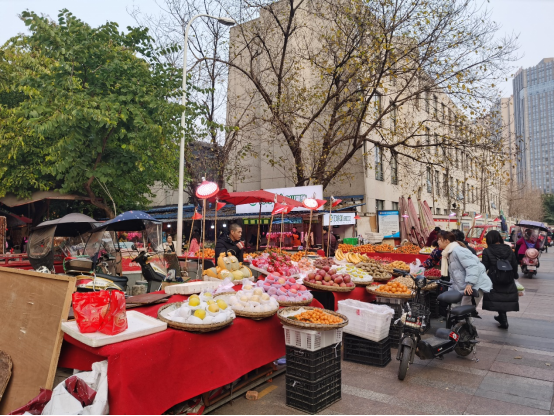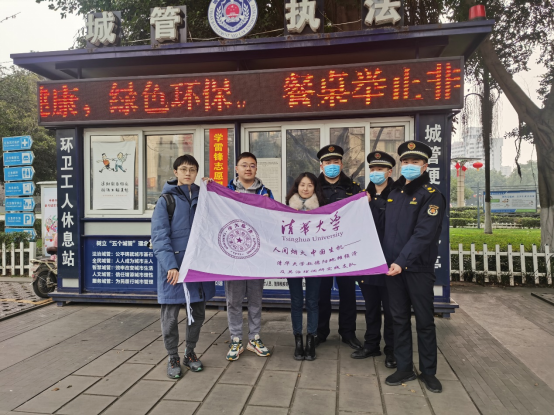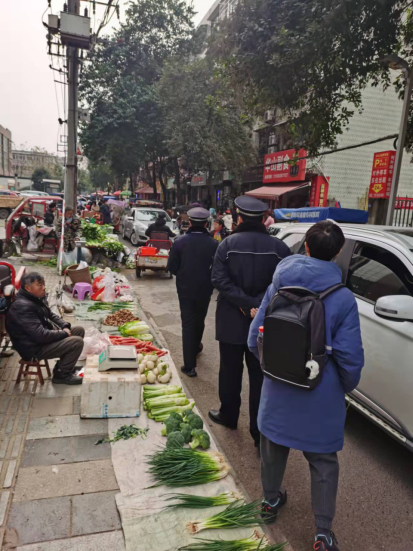About New Development|Telling True and Complex Stories Well
—A summary of the study of the stall economy in Deyang

Thread of Practice
In January 2022, Zhong Tianyu from Xinya College, Tsinghua University led a practice group on a week-long trip to Deyang under the theme of "the stall economy showing the vitality of China" to study the stall economy. The group traveled together with Wang Ziqing from Zhili College, Tsinghua University, under the guidance of Zhang Weite, a teacher at Xinya College.
1. An ambiguous topic
Itinerant vending is a small topic, but clear descriptions of small topics help clear up big topics. The topic is also ambiguous and complex, reflecting the complexity of Chinese society. We hope to be able to see the bigger picture by looking at small components and exploring various details and interactions among different people, so as to understand the complicated operating mechanism and governance logic of China.
2. Reality
To find the truth, we must explain our intentions and fully communicate with the different subjects to gain their acceptance and trust. Only then are people willing to share their real experiences. We must also try our best to objectively distinguish, explore, and reconstruct these experiences to seek truths, even if it might offend the subjects of different groups.
3. Complex stories
We cannot rely only on traditional academic expressions if we wish to tell complex stories well. While streamlining complex problems, we may accidentally ignore the main threads. Many institutional designs and structural factors cannot play a decisive role in real-world activities and we may ignore key details if we focus only on them.

Stories of Practice
Therefore, we wish to come up with new ways to tell these stories more vividly. Below are some examples.
1. Habits of buying and selling
Why does the city need itinerant vendors? Why do the government, urban management officers, and citizens have to accept vendors? Here's a simple analysis of habits of buying and selling.
According to our general understanding, stalls in urban areas are similar to those in bazaars in rural areas. Based on this logic, middle-aged and elderly people like stalls more than young people, and there are more stalls in old urban areas than in new ones. However, the reality is more complicated. Middle-aged and elderly people may prefer fruit, vegetable, and general merchandise vendors more than young people, while young people favor snack vendors more than middle-aged and elderly people. As the occupancy rate of new urban areas increases, more middle-aged and elderly people move into these areas and start to do housework, so the need for vendors in new urban areas may not be lower than that in old urban areas. As a result, vendors will spontaneously form new clusters.
People choose vendors over storekeepers, perhaps because of the price difference. Compared with storekeepers, vendors do not need to pay for rent or utilities. However, this does not guarantee a decrease in price, as the market prices for many of the things sold are stable, and storekeepers may boast unique advantages such as the scale effect.
Vendors' commodities have features that are different from those of the commodities sold by storekeepers. First, vendors need to itinerate to be at the right location at the right time. They always stay in places with a lot of people and can itinerate accordingly. Second, their commodities are neither necessary nor irreplaceable. That is to say, people do not have to buy the commodities and do not come specifically for them, but they buy the commodities when they pass by or on a whim. Third, some vendors still sell fake or poor-quality products. These vendors frequently go from place to place because they fear problems or being accused of selling bad products.
In view of these features, vendors prefer parks, squares, markets, and shopping malls, but they are not willing to enter stores, markets, or shopping malls around parks or squares, because if they do so, they may have to pay costs they cannot afford and more importantly, earn much less money. There is a general consensus among vendors that they would lose half of their expected earnings if they sell at shopping malls or earn no money if they sell on the upper floors of a shopping mall.
For example, we visited an alley in the old urban area of Deyang, close to a market and where lots of vendors are gathered, making it difficult for urban management officers to manage. To solve this problem, they once bought the second floor of a building in the market for the vendors through market-based means. However, the vendors who were driven upstairs by urban management officers, always sold their products downstairs when the officers were not there.
2. Changes in attitudes
Several years ago, urban management officers in Deyang used to enforce the law in abusive or even violent ways. However, thanks to the past few years' efforts with team building and standardized systems, as well as internet public opinion, they have become more self-disciplined and now enforce the law in a procedure-based way. This has changed the attitudes of urban management officers and vendors.
In the past, vendors started running as soon as they saw urban management officers, but they now smile at the officers because they have changed their expectations of the consequences of being discovered. For instance, Deyang has launched a "simple punishment procedure" to empower urban management officers in a comprehensive way, but this seems to have caused harm to their authority. No matter how simple the punishment procedure is, it is probably hard for the officers to punish vendors, as the time required is long or the vendors refuse to accept the punishment. As a result, the officers resort to some old methods. These methods, including confiscating the vendors' scales and criticizing the vendors, are not compliant with the regulations but are acceptable to both sides. In addition, urban management officers' power to impose administrative punishment is marginalized and not guaranteed by force. They do not get public support when they have conflicts with vendors and it is common for them to be spat at or even chased by vendors with knives in Deyang.
Of course, the relationship between urban management officers and vendors is no longer as tense. The policy favorable for the weaker side helps improve the social image of urban management officers and gives them greater social support. One interesting fact is that the change in battlers' manners causes spillover effects. Vendors in surrounding counties and cities know that the management in Deyang is loose and thus go there to set up stalls, causing more troubles for the urban management officers in Deyang.
3. Differentiated management of vendors
According to long-term practice, the institutional foundation for vendor management includes laws, local regulations and administrative regulations. In Deyang, standard procedures, characteristic measures and conventional methods for vendor management have been formed. It is noteworthy that urban management officers and vendors are all living people. Meanwhile, vendors usually have complex conditions and strong liquidity. The discretion in urban management is large and law enforcement supervision is weak. Therefore, personal factors greatly impact urban management.
In simple words, different vendors are managed differently. Vendors have different social backgrounds, commodity composition, and operating models and urban management officers can adjust their management methods in a humanistic manner. Facing suburban farmers who sell what they produce, especially the old and weak with economic difficulties, urban management officers in Deyang are often very patient when talking to them, exempt them from fines, and even help them move to places where sales are allowed. However, this leads to obvious problems. Vendors that make and sell snacks and vendors that resell fruit will question the justice of urban management officers and wonder why they are punished differently from others. As a result, they refuse to accept punishments and reject advice. During the long-term contact with urban management officers, vendors in Deyang have accumulated abundant experience and become familiar with the work unit, management scope, service length, on-duty time, temperament, and law enforcement habits of different officers. They give different responses when they meet different officers.
4. Pressure transfer
Urban management officers and vendors stand on opposite sides of a contradiction to form a unity of opposites. This unity of opposites faces external pressure. The dynamics of external pressure directly cause changes in the balance and operating mechanisms of the internal force in the unity. Many vendors argue that the urban management in Deyang has gone between being loose and strict over the past two years. According to a general calculation, the loose and strict periods last six months each.
Amid the loose period, urban management officers and vendors form a tacit understanding and know each other's bottom lines. Urban management officers manage vendors in a token manner, communicate with them in tactful words, and even turn a blind eye to them to maintain a city appearance and order that are acceptable to most citizens. They do not expect to drive away all vendors and the latter's operation and transaction volumes remain stable. During the strict period, urban management officers work more and harder to inspect the "gray zones". These are periods of strict law enforcement when they strive to remove any vendors they see. Vendors stay inactive during the day and come out at night to try and find good hiding places where they can still do business. Their transaction volumes and stability are greatly impacted. However, this "cat and mouse game" will not lead to the "extermination" of vendors.

5. Multiple interest parties
Vendor management involves multiple interest parties and within the different parties are different factions and interests. All citizens have the right to enjoy not only a clean city and smooth traffic but also life and convenient shopping. When we observe the law enforcement of urban management officers, we noticed a citizen complain to urban management officers that the gathering of vendors caused noise pollution and traffic jams, soon after he had bought vegetables from a vendor at the gate of his community.
Urban management officers in Deyang use various methods such as immobilization and tide-type management. A measure with local characteristics is to establish convenience service sites where needed and allow specific vendors to set up stalls, pay reasonable cleaning fees, and accept unified management by relevant communities. However, this measure faces many practical problems. For example, it's only necessary to establish convenience service sites in places with large human traffic. Such sites may have a negative impact on the city's appearance and order. Besides, communities are not active in vendor management because their responsibilities and earnings do not match. If citizens develop fixed buying habits, convenience service sites will be hard to eliminate, which is against the original intention.
Citizens both love and hate vendors, so do storekeepers. We usually think that storekeepers hate vendors because the latter blocks their stores and steal their business. However, we found that many storekeepers are afraid of the disappearance of surrounding vendors because commodities sold by vendors may be complementary to their own commodities and vendors can help them attract traffic. Sometimes, storekeepers complain that urban management officers eliminate certain convenience service sites or drive away vendors that have gathered spontaneously.
Interest problems in vendor management are far more complex than we imagined. Here are two more examples of what we found during our study. First, in an area of Deyang, vendors that resell fruits have formed a family group. They have mastered various methods to survive the long-term battle and are good at exploiting policy loopholes. They not only know how to hide and behave shamelessly but also reject and threaten their peers, accumulating considerable profit in the process. They are quite different from vendors in the traditional sense.
Second, there is a large living marketplace in an area of Deyang where the surrounding residents like to go shopping. With a high commercial value, this land plot was auctioned by the local government to an enterprise for real estate development. The enterprise promised to turn the first floor into a living marketplace after the construction was completed. During the construction process, the government established a convenience service site on a nearby street to meet the buying and selling needs of surrounding residents and original vendors. After the building was completed, the living marketplace was allocated to the second floor because the real estate developer coveted the commercial value of the first floor and residents had gotten used to the convenience service site. As a result, the residents and vendors were scared away because of the inconvenience. Therefore, the living marketplace has not been opened as yet and the handling of the convenience service site remains an unresolved problem.